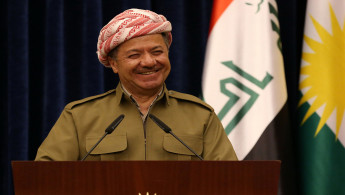Iraq's Kurds move towards Baghdad boycott
Masoud Barzani, president of Iraq's autonomous Kurdish region, is likely this week to announce his intention to boycott the federal government, a senior Kurdish official has said.
Barzani is set to call a meeting of leading Kurdish lawmakers to announce the Baghdad boycott this week, said Ahmed Haji Rashid, the head of the Kurdistan Islamic Group (KIG) faction in the Iraqi parliament.
"The leaders of the Kurdish blocs in the Iraqi parliament and Kurdish ministers in the Iraqi federal government will hold a meeting on Sunday to discuss and assess the final Kurdish stand on the Iraqi government and Prime Minister Haidar al-Abadi's decision," Rashid told al-Araby al-Jadeed.
"An official announcement will be made a few days after the meeting to proclaim a final position on the Baghdad government."
The ratcheting-up of tension has been blamed on the Iraqi federal government's alleged refusal to deliver the Kurdistan region's share of the national budget.
Iraqi Prime Minister Haider al-Abadi has, however, replied that Kurdistan had not yet exported the agreed-upon amount of oil - and will not receive its share until it does so.
The Kurdish Region Government (KRG) has grappled with a deep financial crisis since the beginning of 2014, when then Iraqi Prime Minister Nouri al-Maliki cut its share of the national budget.
Veteran Arab UN diplomat: West responsible for Islamic State. Read more. |
Rashid lashed out at the Iraqi government, saying that Maliki and Abadi had two different personalities, but one shared policy against the Kurds.
"Both prime ministers are hostile to the Kurdistan region and insist on starving its population," he said.
Aram Sheikh Muhammad is the deputy speaker of the Kurdish parliament. He confirmed the meeting will be held on Sunday to discuss relations with Baghdad.
According to the deal reached between Baghdad and Erbil on 2 December, the KRG has to export 250,000 barrels of oil per day, under the supervision of the federal government.
| We are willing to withdraw from the political process if the KRG decides to do so. - Aram Sheikh Muhammad, deputy speaker of the Kurdish parliament |
"The meeting will mull the outcomes of the visit made by a Kurdistan regional delegation to Turkey to discuss the region's financial crisis," he added.
"Just as a Kurdish delegation visited Baghdad, and we joined the federal government and the parliament upon the KRG's decision, we are willing to withdraw from the political process if the KRG decides to do so," Sheikh Muhammad concluded.
Turkish officials are reportedly keen to help Kurdistan sell oil, ostensibly to help the region's current cashflow crisis, after Kurdish Prime Minister Nechirvan Barzani visited Ankara last week.
The Iraqi constitution
Abadi reportedly told his Turkish counterpart that the two nations should respect each other, and that Iraqi oil belongs to "all of Iraq".
But according to Biwa Khansi, the Kurdish economic security adviser, Kurdistan won't be violating the Iraqi constitution if it decided to sell oil, "as long as the revenues are going to the state's budget".
"Article 111 of the constitution stipulates that the Kurdistan region has a share of state revenues," he said.
The article states that oil and gas belong to "all the people of Iraq in all regions and governorates".
Speaking to al-Araby, Khansi said Baghdad's suspension of the KRG budget was "tantamount to a direct war waged on this region".
| Baghdad is telling the Kurds that they can't stay together; the ball is now in the Kurds' court. - Muhammad Haji Mahmoud |
Under the deal reached with Baghdad, Kurdish fields are to export 250,000 barrels per day through Iraq's state oil marketing organisation (SOMO), while an additional 300,000 bpd from the Iraqi area of Kirkuk would be exported via a pipeline running through Kurdish territory.
The Kurdistan region has abided by the agreement, said Khansi, contrary to the prime minister's reported statement. Khansi asked why Baghdad had failed to respect the deal.
"Kurdistan needs approximately $730 million every month to pay public sector employees. If the region manages to export 400,000 barrels of oil per day, it would earn about $600 million every month to pay the salaries," he added.
"The best solution is to hold a dialogue to guarantee that Baghdad will be committed to pay the Kurds 17 percent of Iraq's national budget, securing an equitable distribution of income; or else the Kurdistan region will resolve the crisis on its own."
Kurdish politicians hint that Baghdad's position is pushing the Kurds away from federal Iraq.
The general-secretary of the Kurdistan Social Democratic Party (KSDP), Muhammad Haji Mahmood, said Baghdad could pay Mosul, Tikrit and other regions controlled by the Islamic State group - but did not have enough funds when it comes to the Kurdistan region.
"To cut a long story short, officials in Baghdad are telling the Kurds that they can't stay together; so the ball is now in the Kurds' court because Iraq is in fact divided into three states," said Mahmood.
This is an edited translation from our Arabic edition.



